- <a href="https://library.nhrc.or.th/th" aria-label="home" class="mainMenu"> <em class="fas fa-home"></em> </a>
-
เกี่ยวกับเรา
ย้อนกลับ เกี่ยวกับเรา<a href="https://library.nhrc.or.th/th/history" aria-label="menu" class="submenu-list" target="_self"> ความเป็นมา </a> <a href="https://library.nhrc.or.th/th/structure" aria-label="menu" class="submenu-list" target="_self"> โครงสร้าง </a> <a href="https://library.nhrc.or.th/th/vision" aria-label="menu" class="submenu-list" target="_self"> วิสัยทัศน์/พันธกิจ </a> <a href="https://library.nhrc.or.th/th/award" aria-label="menu" class="submenu-list" target="_self"> รางวัล </a> <a href="https://library.nhrc.or.th/th/announce" aria-label="menu" class="submenu-list" target="_self"> ระเบียบ/ประกาศ </a> นโยบายองค์กรอัลบั้มภาพ<a href="https://library.nhrc.or.th/th/website-policy" aria-label="menu" class="submenu-list"> นโยบายเว็บไซต์ </a> <a href="https://library.nhrc.or.th/th/website-security-policy" aria-label="menu" class="submenu-list"> นโยบายการรักษาความมั่นคงปลอดภัยเว็บไซต์ </a> <a href="https://library.nhrc.or.th/th/personal-information-protection-policy" aria-label="menu" class="submenu-list"> นโยบายการคุ้มครองข้อมูลส่วนบุคคล </a> <a href="https://library.nhrc.or.th/th/privacy-policies" aria-label="menu" class="submenu-list"> นโยบายความเป็นส่วนตัว </a> <a href="https://library.nhrc.or.th/th/terms-of-service" aria-label="menu" class="submenu-list"> เงื่อนไขการใช้บริการ </a> <a href="https://library.nhrc.or.th/th/cookies-policy" aria-label="menu" class="submenu-list"> นโยบายคุกกี้ </a><a href="https://library.nhrc.or.th/th/album-image" aria-label="menu" class="submenu-list"> อัลบั้มภาพ </a> <a href="https://library.nhrc.or.th/th/gallery360" aria-label="menu" class="submenu-list"> ภาพ 360° </a>
-
บริการ
ย้อนกลับ บริการ<a href="https://library.nhrc.or.th/th/borrow-and-return" aria-label="menu" class="submenu-list" target="_self"> การยืม-คืน </a> <a href="https://library.nhrc.or.th/th/service" aria-label="menu" class="submenu-list" target="_self"> บริการทั้งหมด </a> <a href="https://library.nhrc.or.th/th/flow-service" aria-label="menu" class="submenu-list" target="_self"> ขั้นตอนการใช้บริการ </a> <a href="https://library.nhrc.or.th/th/imfortable" aria-label="menu" class="submenu-list" target="_self"> สิ่งอำนวยความสะดวก </a> แบบฟอร์มบริการ<a href="https://forms.gle/syLmif2eKJ3kfA2g9" aria-label="menu" class="submenu-list" target="_blank"> ประเมินความพึงพอใจ </a> <a href="https://library.nhrc.or.th/th/event" aria-label="menu" class="submenu-list" target="_self"> กิจกรรม </a> <a href="https://library.nhrc.or.th/th/plan" aria-label="menu" class="submenu-list" target="_self"> แนะนำพื้นที่ </a><a href="https://library.nhrc.or.th/th/form-search" aria-label="menu" class="submenu-list"> แบบฟอร์มบริการค้นหาสารสนเทศ </a> <a href="https://library.nhrc.or.th/th/form-suggestions" aria-label="menu" class="submenu-list"> แบบฟอร์มแนะนำทรัพยากรสารสนเทศ </a>
-
แหล่งสารสนเทศ
ย้อนกลับ แหล่งสารสนเทศ<a href="https://library.nhrc.or.th/th/search?ctrl=kw&searchopt=&type=place&keyword=14" aria-label="menu" class="submenu-list" target="_self"> สิ่งพิมพ์สำนักงาน กสม. </a> <a href="https://library.nhrc.or.th/th/search" aria-label="menu" class="submenu-list" target="_self"> ทรัพยากรสารสนเทศทั้งหมด </a> สารสนเทศด้านสิทธิมนุษยชน<a href="https://library.nhrc.or.th/th/network" aria-label="menu" class="submenu-list" target="_self"> เครือข่ายความร่วมมือระหว่างห้องสมุด </a> <a href="https://library.nhrc.or.th/th/dictionary" aria-label="menu" class="submenu-list" target="_self"> พจนานุกรมศัพท์สิทธิมนุษยชน </a> <a href="https://library.nhrc.or.th/th/sourceresearch" aria-label="menu" class="submenu-list" target="_self"> ฐานข้อมูลงานวิจัย/วิทยานิพนธ์ </a> <a href="https://www.tci-thaijo.org/" aria-label="menu" class="submenu-list" target="_blank"> ฐานข้อมูลวารสารอิเล็กทรอนิกส์ (ThaiJO) </a> <a href="https://ncx.dataxet.co/" aria-label="menu" class="submenu-list" target="_blank"> ฐานข้อมูลข่าวออนไลน์ </a> <a href="http://library.nhrc.or.th/document/Manual/APA.pdf" aria-label="menu" class="submenu-list" target="_blank"> คู่มือการเขียนอ้างอิงทางวิชาการ </a><a href="https://library.nhrc.or.th/th/law-of-human-rights" aria-label="menu" class="submenu-list"> กฎหมายด้านสิทธิมนุษยชน </a> <a href="https://library.nhrc.or.th/th/international-human-rights" aria-label="menu" class="submenu-list"> สิทธิมนุษยชนระหว่างประเทศ </a> <a href="https://library.nhrc.or.th/th/international-human-rights-treaties" aria-label="menu" class="submenu-list"> พันธกรณีระหว่างประเทศ </a> <a href="https://library.nhrc.or.th/th/national-human-rights-commissions" aria-label="menu" class="submenu-list"> สถาบันสิทธิมนุษยชนแห่งชาติ </a> <a href="https://library.nhrc.or.th/th/judgment" aria-label="menu" class="submenu-list"> คำพิพากษาของศาล </a> <a href="https://library.nhrc.or.th/th/human-rights-online-resources" aria-label="menu" class="submenu-list"> แหล่งสารสนเทศด้านสิทธิมนุษยชน </a> <a href="https://library.nhrc.or.th/th/un-and-affiliated-agencies" aria-label="menu" class="submenu-list"> กองทุนและโครงการของสหประชาชาติ </a>
-
สถิติ
ย้อนกลับ สถิติ<a href="https://library.nhrc.or.th/th/statistic/1" aria-label="menu" class="submenu-list" target="_self"> การเข้าใช้บริการ </a> <a href="https://library.nhrc.or.th/th/statistic/2" aria-label="menu" class="submenu-list" target="_self"> การยืมทรัพยากรสารสนเทศ </a> <a href="https://library.nhrc.or.th/th/statistic/3" aria-label="menu" class="submenu-list" target="_self"> บริการตอบคำถามและช่วยการค้นคว้า </a> <a href="https://library.nhrc.or.th/th/statistic/4" aria-label="menu" class="submenu-list" target="_self"> จำนวนทรัพยากรสารสนเทศ </a> <a href="https://library.nhrc.or.th/th/statistic/5" aria-label="menu" class="submenu-list" target="_self"> จำนวนผู้เยี่ยมชมและศึกษาดูงาน </a> <a href="https://library.nhrc.or.th/th/statistic/6" aria-label="menu" class="submenu-list" target="_self"> การใช้งานผ่านเว็บไซต์ </a> <a href="https://library.nhrc.or.th/th/statistic/7" aria-label="menu" class="submenu-list" target="_self"> รายงานผลการปฎิบัติงานฯ </a>
-
ติดต่อเรา
ย้อนกลับ ติดต่อเรา<a href="https://library.nhrc.or.th/th/faq" aria-label="menu" class="submenu-list" target="_self"> คำถามที่พบบ่อย </a> <a href="https://library.nhrc.or.th/th/opening-hours-close-calendar" aria-label="menu" class="submenu-list" target="_self"> เวลาทำการ/ปฏิทินวันหยุด </a> <a href="https://library.nhrc.or.th/th/contacts-us" aria-label="menu" class="submenu-list" target="_self"> ติดต่อเรา </a>
-
สมาชิก
ย้อนกลับ สมาชิก<a href="https://library.nhrc.or.th/th/membership-application" aria-label="menu" class="submenu-list" target="_self"> สมัครสมาชิก </a> <a href="https://library.nhrc.or.th/th/member/login" aria-label="menu" class="submenu-list" target="_self"> ระบบสมาชิก </a>
When is discrimination wrong?
| ประเภท | เลขเรียก | สถานที่ | สถานะ | |
|
HM1106 H477 2008 |
มุมหนังสือทั่วไป | บนชั้น | ขอยืม |
| ISBN |
9780674027978 (pbk.)
|
| เลขเรียก |
HM1106 H477 2008
|
| ผู้แต่ง | |
| ชื่อเรื่อง |
When is discrimination wrong? / Deborah Hellman
|
| พิมพลักษณ์ |
Cambridge, Massachusetts : Harvard University Press, 2008.
|
| รูปเล่ม |
205 p. ; 25 cm.
|
| บทคัดย่อ |
A law requires black bus passengers to sit in the back of the bus. The U.S. Food and Drug Administration approves a drug for use by black heart failure patients. A state refuses to license drivers under age 16. A company avoids hiring women between the ages of 20 and 40. We routinely draw distinctions among people on the basis of characteristics that they possess or lack. While some distinctions are benign, many are morally troubling. In this boldly conceived book, Deborah Hellman develops a much-needed general theory of discrimination. She demonstrates that many familiar ideas about when discrimination is wrong-when it is motivated by prejudice, grounded in stereotypes, or simply departs from merit-based decision-making-won't adequately explain our widely shared intuitions. Hellman argues that, in the end, distinguishing among people on the basis of traits is wrong when it demeans any of the people affected. She deftly explores the question of how we determine what is in fact demeaning. Claims of wrongful discrimination are among the most common moral claims asserted in public and private life. Yet the roots of these claims are often left unanalyzed. When Is Discrimination Wrong? explores what it means to treat people as equals and thus takes up a central problem of democracy.
|
| หัวเรื่อง | |
| หัวเรื่อง | |
| คำศัพท์ | |
| เชื่อมโยง |
| LEADER : 00000nab 2200000uu 4500 |
| 008 190517s2008||||mau 000 0 eng d |
| 020 ^a9780674027978 (pbk.) |
| 050 00^aHM1106^bH477 2008 |
| 100 1 ^aHellman, Deborah,^d1963- |
| 245 00^aWhen is discrimination wrong? /^cDeborah Hellman |
| 260 ^aCambridge, Massachusetts :^bHarvard University Press, ^c2008. |
| 300 ^a205 p. ^c25 cm. |
| 504 ^aIncludes bibliographical references and index |
| 520 ^aA law requires black bus passengers to sit in the back of the bus. The U.S. Food and Drug Administration approves a drug for use by black heart failure patients. A state refuses to license drivers under age 16. A company avoids hiring women between the ages of 20 and 40. We routinely draw distinctions among people on the basis of characteristics that they possess or lack. While some distinctions are benign, many are morally troubling. In this boldly conceived book, Deborah Hellman develops a much-needed general theory of discrimination. She demonstrates that many familiar ideas about when discrimination is wrong-when it is motivated by prejudice, grounded in stereotypes, or simply departs from merit-based decision-making-won't adequately explain our widely shared intuitions. Hellman argues that, in the end, distinguishing among people on the basis of traits is wrong when it demeans any of the people affected. She deftly explores the question of how we determine what is in fact demeaning. Claims of wrongful discrimination are among the most common moral claims asserted in public and private life. Yet the roots of these claims are often left unanalyzed. When Is Discrimination Wrong? explores what it means to treat people as equals and thus takes up a central problem of democracy. |
|
650 0^aDiscrimination
650 0^aInterpersonal relations |
| 653 ^aNew Arrivals 06-2019 |
| 856 40^3Content^uhttp://library.nhrc.or.th/ulib/document/Content/T10578.pdf |
| 917 ^aGift :^c672 |
| 955 ^a1 copy |
| 999 ^asaithip |
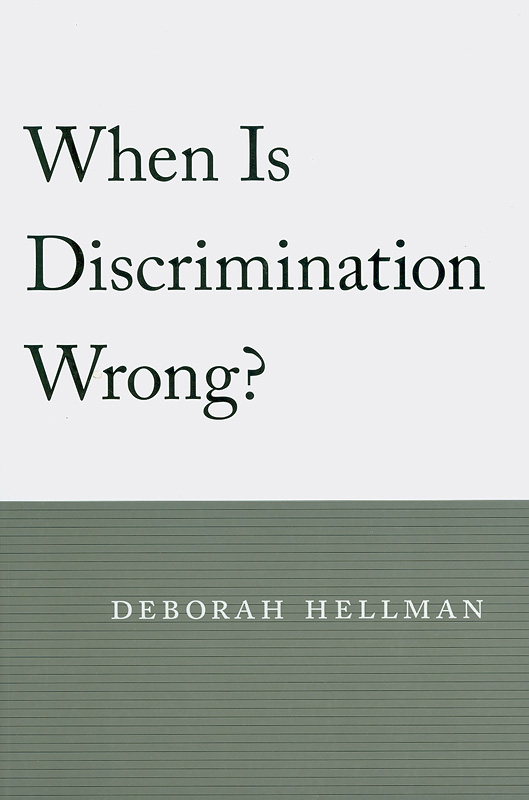
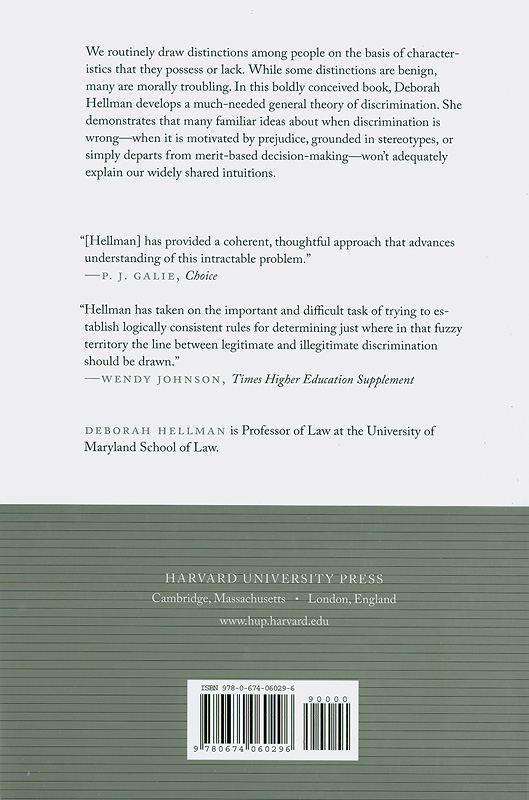
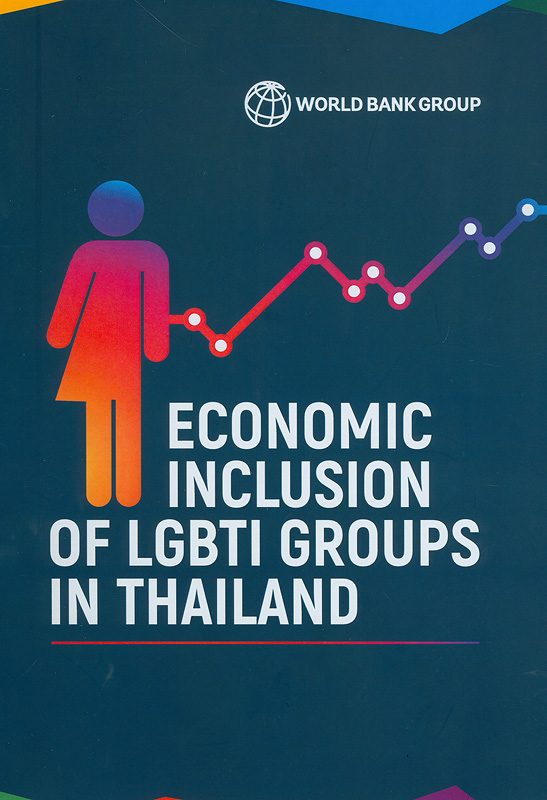

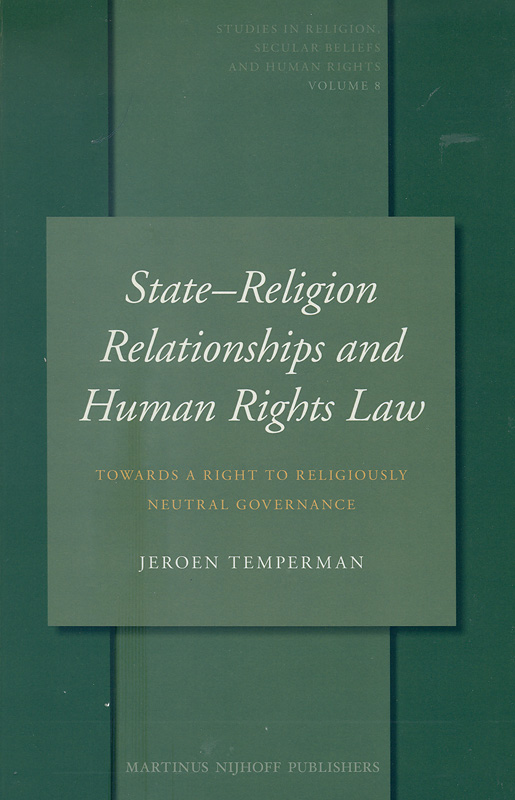
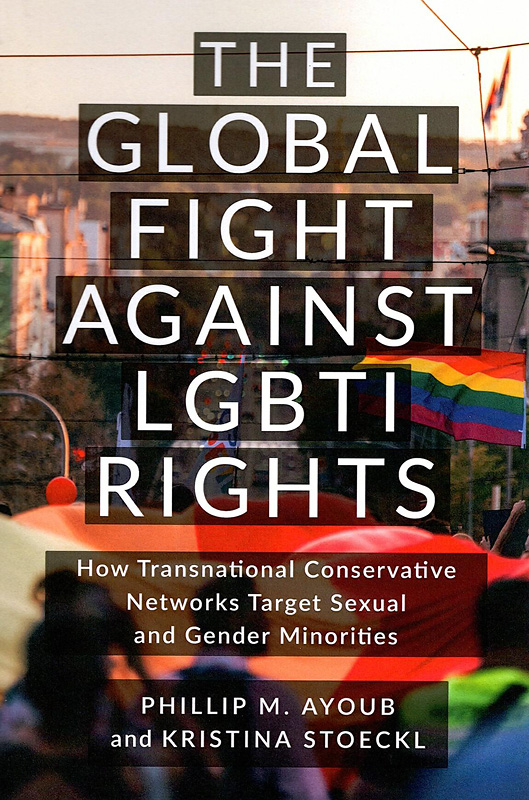
ก่อนเพิ่มแท็กหรือแสดงความคิดเห็น